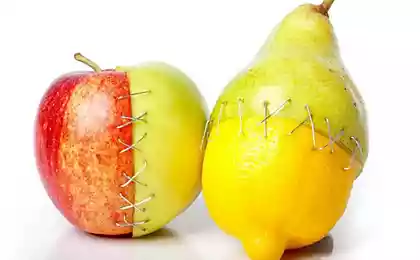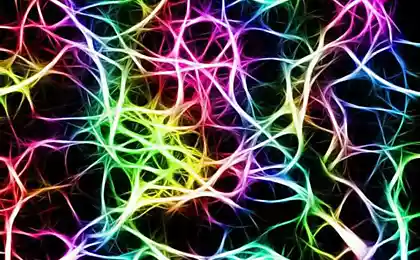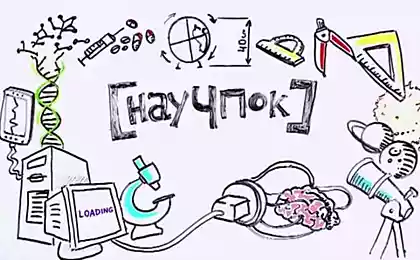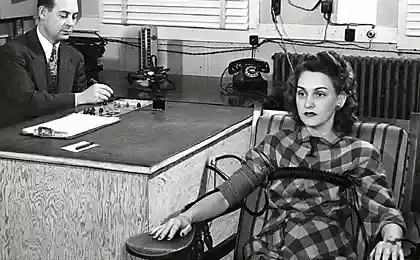783
10 things the brain does without your help
The brain is an important part of our life experience. It allows us to do things – to think, to control their and other muscles. But what about activities that our brain performs without any participation of our consciousness?
This article presents ten functions that our brain does without our help.
1. Filtering of information
SUBSCRIBE to OUR youtube channel that allows you to watch online, download from YouTube free video about the recovery, the rejuvenation of man. Love for others and ourselves, as the feeling of high vibrations — an important factor
Every day we are bombarded by a continuous flow of information so much that we can't perceive it all. Not looking: do You know what color socks you put on in the morning? What was he dressed like the first person You saw today? If You can't answer these questions, don't worry, You don't lose memory! Our brain is constantly busy filtering unnecessary information. This allows us to focus on what really matters. For example, if You are watching a football match, hardly aware of what is happening in the crowd, even though Your brain perceives this information.
This process is called selective (selective, selective) attention. It allows us not to go crazy with a vast amount of information that accompanies us always and everywhere. However, some information can still bypass the barrier of our attention. That's why we react, when we hear his name in conversation with other people. To confirm this theory, scientists Christopher Chabris and Daniel Simons of Harvard University conducted an experiment, which You can see in the video above. How many times players in white passed each other the ball? The answer might surprise You.
2. Twink

Blinking is something we all do approximately every 2-10 seconds. We realize that blink only when someone focuses attention on this. (Now You most likely will think about it all the time while reading this article.) But how is our brain able to manage to blink without our conscious participation? Blinking is an involuntary reflex action designed to protect and maintain the moisture of our eyes.
In the external area of Your eye constantly produces tears that lubricate and cleanse them when You move eyelids during blinking. The automatic system governing the blinking process also ensures the closure of Your eyelids when something hits You in the face. And although we can consciously force yourself not to blink system, in the end, still make us do it again.
3. Movement of the tongue when pronouncing the words

When we talk only about what we consciously think is the words that are spoken. However, as they are obtained (movement of the tongue and mouth), we are not aware of.
First we learn to talk by imitating single words, then begin to combine them into sentences, interpret meaning, create structure and so on. When we imitate the sound of new words, our brain makes us consciously think about what position to put the language to get a particular sound.
Over time, our ability to pronounce each sound becomes more developed, and the conscious mind no longer need to participate in the process of setting the language and movements of the lips; it becomes involuntary. This explains why in conversation we are thinking how to move his tongue. Muscle learned all the movements, so the brain automatically controls our tongue and lips when we want to say something.
4. Our brain makes us believe that we are better

Imagine that You have a child who wants to become an artist. He brings You his, frankly, terrible figure who is very proud of. What would You tell him? Most parents expressed admiration for the creation of his child, even if I would not believe in what they say.
However, when the child grows up, he can look at the picture and wonder why everyone thought he was good. When someone speaks positively about us, we form the belief that meet the expressed criteria. It changes our view of his identity. We believe that are better than really are.
The research presented in the documentary "(Not)honesty: the truth about lying" shows how people who believe that passed the first test of a good result, more confidently perform the following task, although neither level of knowledge nor the ease of the questions was not changed.
In the experiment, the participants were provided with the answers to the test questions at the bottom of the page and said that they can use them if you want. It is not surprising that the job they performed very well. Answers to the second test was not provided. Participants who believe in themselves after the first test, answered the questions of the second task faster and did not check mistakes. However, the results of the second test was worse compared to the first.
5. Temperature controls

The human brain controls not only social processes, but also what happens inside our body, such as temperature. It is very important that our body temperature did not rise above 37 degrees Celsius. This creates the ideal conditions necessary for the successful flow of vital processes. But how is the brain able to regulate body temperature without our participation?
Information about our external environment is perceived by sensory receptors located in the skin, and then transmitted through the nervous system to the hypothalamus. Blood also has receptors that alert the hypothalamus about changes in internal body temperature to the brain was able to take the appropriate action.
For example, if it's cold outside, the brain makes up the hairs covering our skin. This allows us to absorb more heat. If it's too hot, we start sweating. Through evaporation, the brain lowers our body temperature.
6. Change memory

Many of us think that if we did experience something, you will remember everything as it was. However, in reality it is not, as evidenced by the results of a psychological study conducted by Elizabeth Loftus and John Palmer in 1974.
In the experiment, participants were asked to watch car accidents and then were asked a series of standard questions about what they saw. They were then divided into three groups, each of which asked the same question, but with slightly different wording.
The two groups asked about what was the speed of the car. In the first case to describe the collision used the verb "hit" and the second "break". Third, the control group on speed were not asked at all.
A few weeks later, among the participants were again interviewed. This time, the researchers asked them about whether it was the video broken glass. (In fact it was not.) Participants who said that the machine "crashed", more often gave affirmative answers to this question than members of the control group and those who previously talked about "blow". It turns out that our brain is able to retrieve details from memory, adding a new, false information.
7. Maintain balance

When we go, not thinking about how much work is performed by our brain to maintain equilibrium. Help him in the eyes, muscles, joints and the vestibular apparatus.
Our eyes perceive information about the world using light falling on the rods and cones in the retina that send visual impulses to the brain, warning him about the location of objects and other stimuli.
Muscles and joints are responsible for sending signals to the brain about the elasticity and pressure when walking. When we bend forward, most of the pressure falls on the forefoot. When you perform any movement of our body sends a signal to the brain, which allows him to judge where we are in space. Signals originating from the ankles, allow us to judge the texture and surface quality, and our body responds accordingly.
8. Sneezing

Sometimes it seems to us that an irresistible desire to sneeze there for no reason. Although sneezing can be triggered by allergies or an irritant, causing itching, often we don't realize that in our nose there is something of concern to us, until, until cinem.
When we sneeze, the irritant is in the respiratory epithelium lining the nose. Fat cells eosinophils produce chemicals such as histamine or leukotrienes. Their release is due to any irritant- allergen-filtered particles, viral respiratory tract infection or smoke. After an irritant stimulus triggers the release of chemicals, blood vessels in the nose leak fluid that stimulates the nerve endings, causing itching.
The stimulation of nerve endings activates a reflex reaction in the human brain. Sensitive nerves cause activation of nerves that controls the muscles of the neck and head. The rapid air flow in the nose is formed by the growth pressure in the chest. At this point the vocal cords are closed (reflex action). When they open again, the air comes out at high speed, and with it the irritant.
9. Shiver

Shivering is another protective reflex action. It occurs due to the activation of the hypothalamus, in the brain located just above the thalamus. When touch receptors in the skin detect temperature drop in the external environment, our nervous system sends a signal to the hypothalamus, which in turn, informs the muscles, causing them to shrink.
Shivering increases body temperature. It is out of our control as it is a reflex action. The shaking will not stop until our body temperature will not rise above a certain point.
10. Laughter

In an article published in 1998, explains how the brain is linked to our impulse to laugh. It is about a girl named A. K., who had surgery for relief of epilepsy. The doctor A. K. found that stimulation of the upper part of the front gyrus area of approximately four square centimeters, has always evoked laughter from the girls. (This brain area is part of the supplementary motor area.) She laughed and then said she was funny. The reason each time was different. A. K. first laughed, and then made up a story thought it was funny.
The difference between the past, present and future is only a persistent illusion
9 qualities that will transform your career
The authors believe that laughter is linked to multiple areas of our brain, each of which is responsible for adding different elements to the experience. Scientists have isolated the emotional response, the cognitive process of understanding why something is funny, and uncontrolled reaction, which is manifested in the movement of facial muscles and lips creating a smile. After interpretation of any situation, funny how our brain provokes a physical reaction, which is why it is very difficult to control your laughter.published
Put LIKES and share with your FRIENDS!
www.youtube.com/channel/UCXd71u0w04qcwk32c8kY2BA/videos
Subscribe - https://www.facebook.com//
P. S. And remember, only by changing their consumption — together we change the world! ©
Source: muz4in.net/news/10_veshhej_kotorye_mozg_delaet_bez_nashej_pomoshhi/2016-07-12-41511
This article presents ten functions that our brain does without our help.
1. Filtering of information
SUBSCRIBE to OUR youtube channel that allows you to watch online, download from YouTube free video about the recovery, the rejuvenation of man. Love for others and ourselves, as the feeling of high vibrations — an important factor
Every day we are bombarded by a continuous flow of information so much that we can't perceive it all. Not looking: do You know what color socks you put on in the morning? What was he dressed like the first person You saw today? If You can't answer these questions, don't worry, You don't lose memory! Our brain is constantly busy filtering unnecessary information. This allows us to focus on what really matters. For example, if You are watching a football match, hardly aware of what is happening in the crowd, even though Your brain perceives this information.
This process is called selective (selective, selective) attention. It allows us not to go crazy with a vast amount of information that accompanies us always and everywhere. However, some information can still bypass the barrier of our attention. That's why we react, when we hear his name in conversation with other people. To confirm this theory, scientists Christopher Chabris and Daniel Simons of Harvard University conducted an experiment, which You can see in the video above. How many times players in white passed each other the ball? The answer might surprise You.
2. Twink

Blinking is something we all do approximately every 2-10 seconds. We realize that blink only when someone focuses attention on this. (Now You most likely will think about it all the time while reading this article.) But how is our brain able to manage to blink without our conscious participation? Blinking is an involuntary reflex action designed to protect and maintain the moisture of our eyes.
In the external area of Your eye constantly produces tears that lubricate and cleanse them when You move eyelids during blinking. The automatic system governing the blinking process also ensures the closure of Your eyelids when something hits You in the face. And although we can consciously force yourself not to blink system, in the end, still make us do it again.
3. Movement of the tongue when pronouncing the words

When we talk only about what we consciously think is the words that are spoken. However, as they are obtained (movement of the tongue and mouth), we are not aware of.
First we learn to talk by imitating single words, then begin to combine them into sentences, interpret meaning, create structure and so on. When we imitate the sound of new words, our brain makes us consciously think about what position to put the language to get a particular sound.
Over time, our ability to pronounce each sound becomes more developed, and the conscious mind no longer need to participate in the process of setting the language and movements of the lips; it becomes involuntary. This explains why in conversation we are thinking how to move his tongue. Muscle learned all the movements, so the brain automatically controls our tongue and lips when we want to say something.
4. Our brain makes us believe that we are better

Imagine that You have a child who wants to become an artist. He brings You his, frankly, terrible figure who is very proud of. What would You tell him? Most parents expressed admiration for the creation of his child, even if I would not believe in what they say.
However, when the child grows up, he can look at the picture and wonder why everyone thought he was good. When someone speaks positively about us, we form the belief that meet the expressed criteria. It changes our view of his identity. We believe that are better than really are.
The research presented in the documentary "(Not)honesty: the truth about lying" shows how people who believe that passed the first test of a good result, more confidently perform the following task, although neither level of knowledge nor the ease of the questions was not changed.
In the experiment, the participants were provided with the answers to the test questions at the bottom of the page and said that they can use them if you want. It is not surprising that the job they performed very well. Answers to the second test was not provided. Participants who believe in themselves after the first test, answered the questions of the second task faster and did not check mistakes. However, the results of the second test was worse compared to the first.
5. Temperature controls

The human brain controls not only social processes, but also what happens inside our body, such as temperature. It is very important that our body temperature did not rise above 37 degrees Celsius. This creates the ideal conditions necessary for the successful flow of vital processes. But how is the brain able to regulate body temperature without our participation?
Information about our external environment is perceived by sensory receptors located in the skin, and then transmitted through the nervous system to the hypothalamus. Blood also has receptors that alert the hypothalamus about changes in internal body temperature to the brain was able to take the appropriate action.
For example, if it's cold outside, the brain makes up the hairs covering our skin. This allows us to absorb more heat. If it's too hot, we start sweating. Through evaporation, the brain lowers our body temperature.
6. Change memory

Many of us think that if we did experience something, you will remember everything as it was. However, in reality it is not, as evidenced by the results of a psychological study conducted by Elizabeth Loftus and John Palmer in 1974.
In the experiment, participants were asked to watch car accidents and then were asked a series of standard questions about what they saw. They were then divided into three groups, each of which asked the same question, but with slightly different wording.
The two groups asked about what was the speed of the car. In the first case to describe the collision used the verb "hit" and the second "break". Third, the control group on speed were not asked at all.
A few weeks later, among the participants were again interviewed. This time, the researchers asked them about whether it was the video broken glass. (In fact it was not.) Participants who said that the machine "crashed", more often gave affirmative answers to this question than members of the control group and those who previously talked about "blow". It turns out that our brain is able to retrieve details from memory, adding a new, false information.
7. Maintain balance

When we go, not thinking about how much work is performed by our brain to maintain equilibrium. Help him in the eyes, muscles, joints and the vestibular apparatus.
Our eyes perceive information about the world using light falling on the rods and cones in the retina that send visual impulses to the brain, warning him about the location of objects and other stimuli.
Muscles and joints are responsible for sending signals to the brain about the elasticity and pressure when walking. When we bend forward, most of the pressure falls on the forefoot. When you perform any movement of our body sends a signal to the brain, which allows him to judge where we are in space. Signals originating from the ankles, allow us to judge the texture and surface quality, and our body responds accordingly.
8. Sneezing

Sometimes it seems to us that an irresistible desire to sneeze there for no reason. Although sneezing can be triggered by allergies or an irritant, causing itching, often we don't realize that in our nose there is something of concern to us, until, until cinem.
When we sneeze, the irritant is in the respiratory epithelium lining the nose. Fat cells eosinophils produce chemicals such as histamine or leukotrienes. Their release is due to any irritant- allergen-filtered particles, viral respiratory tract infection or smoke. After an irritant stimulus triggers the release of chemicals, blood vessels in the nose leak fluid that stimulates the nerve endings, causing itching.
The stimulation of nerve endings activates a reflex reaction in the human brain. Sensitive nerves cause activation of nerves that controls the muscles of the neck and head. The rapid air flow in the nose is formed by the growth pressure in the chest. At this point the vocal cords are closed (reflex action). When they open again, the air comes out at high speed, and with it the irritant.
9. Shiver

Shivering is another protective reflex action. It occurs due to the activation of the hypothalamus, in the brain located just above the thalamus. When touch receptors in the skin detect temperature drop in the external environment, our nervous system sends a signal to the hypothalamus, which in turn, informs the muscles, causing them to shrink.
Shivering increases body temperature. It is out of our control as it is a reflex action. The shaking will not stop until our body temperature will not rise above a certain point.
10. Laughter

In an article published in 1998, explains how the brain is linked to our impulse to laugh. It is about a girl named A. K., who had surgery for relief of epilepsy. The doctor A. K. found that stimulation of the upper part of the front gyrus area of approximately four square centimeters, has always evoked laughter from the girls. (This brain area is part of the supplementary motor area.) She laughed and then said she was funny. The reason each time was different. A. K. first laughed, and then made up a story thought it was funny.
The difference between the past, present and future is only a persistent illusion
9 qualities that will transform your career
The authors believe that laughter is linked to multiple areas of our brain, each of which is responsible for adding different elements to the experience. Scientists have isolated the emotional response, the cognitive process of understanding why something is funny, and uncontrolled reaction, which is manifested in the movement of facial muscles and lips creating a smile. After interpretation of any situation, funny how our brain provokes a physical reaction, which is why it is very difficult to control your laughter.published
Put LIKES and share with your FRIENDS!
www.youtube.com/channel/UCXd71u0w04qcwk32c8kY2BA/videos
Subscribe - https://www.facebook.com//
P. S. And remember, only by changing their consumption — together we change the world! ©
Source: muz4in.net/news/10_veshhej_kotorye_mozg_delaet_bez_nashej_pomoshhi/2016-07-12-41511






















